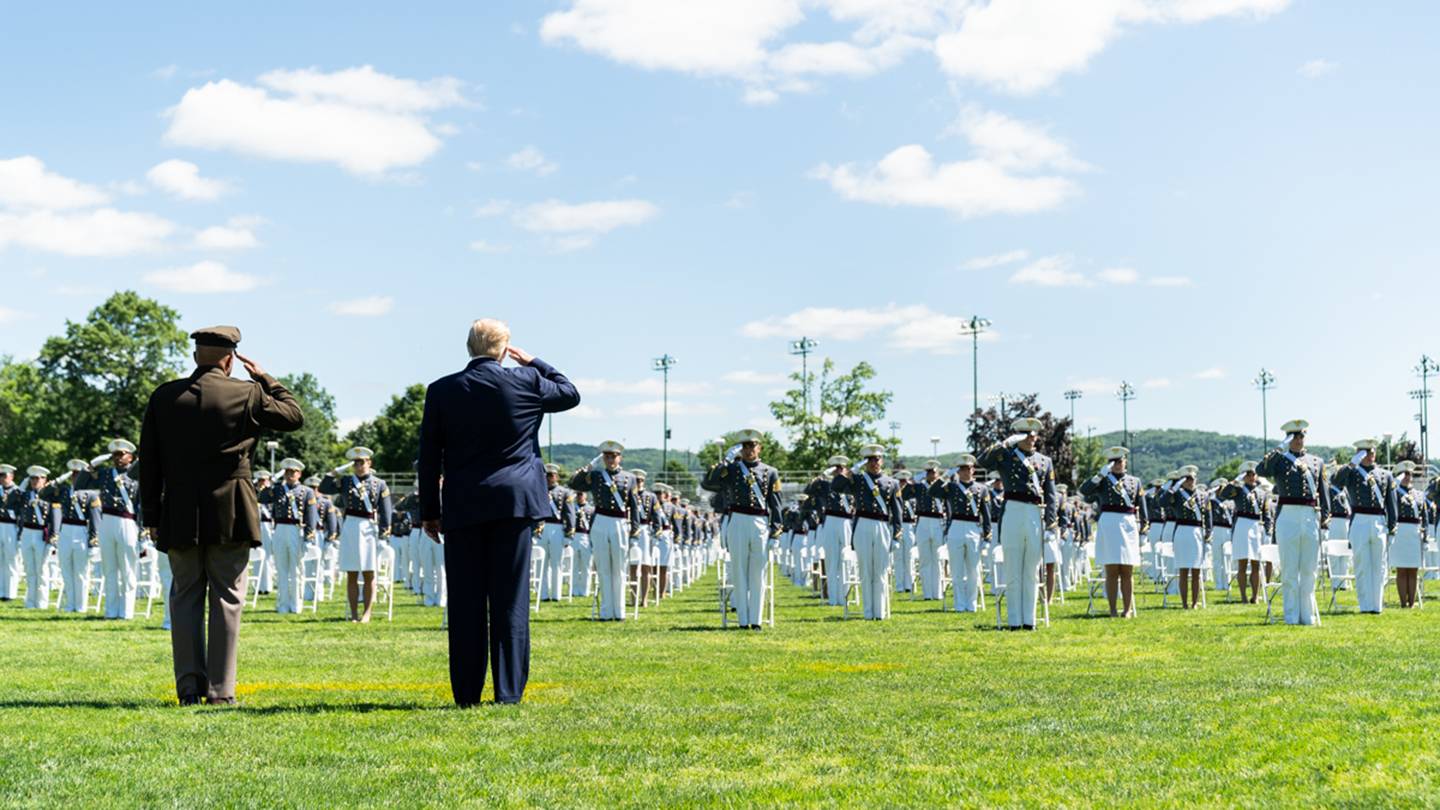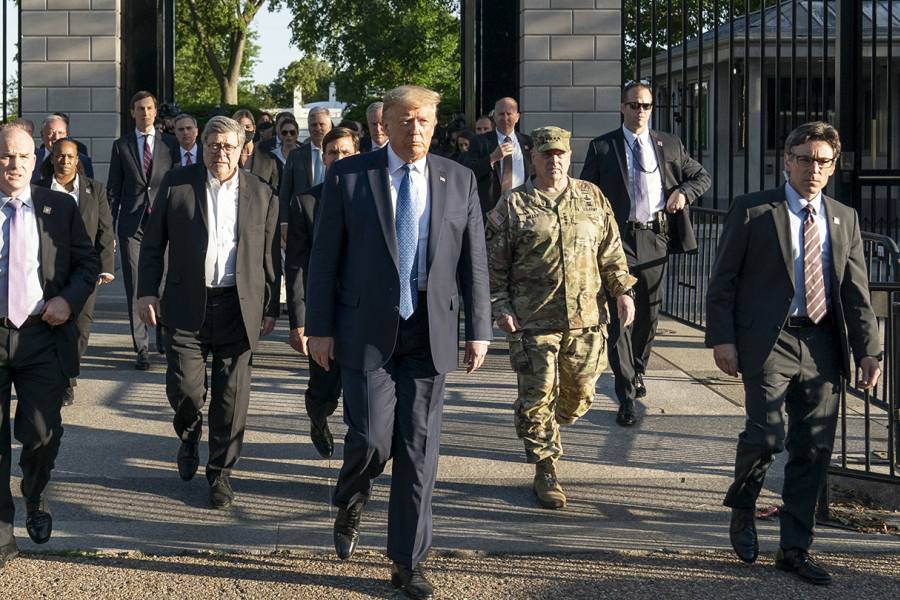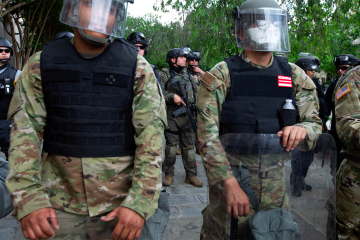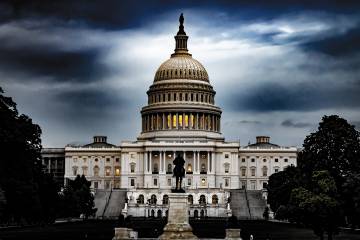On June 1, police and National Guard troops used tear gas, rubber bullets, and other riot control tactics to forcefully clear peaceful protesters from Lafayette Square in Washington and surrounding streets, creating a path for President Donald Trump and senior administration officials to walk from the White House across the street to a boarded-up St. John's Episcopal Church (damaged by fire the day before), where the president held up a Bible and posed for a photo. Just after, the president posed again with a group that included Gen. Mark A. Milley, the chairman of the Joint Chiefs of Staff, and Secretary of Defense Mark Esper.
The Lafayette Square events and images brought extraordinary public criticism, as well as strong rebukes from a number of high-profile former military officials, alarmed that top active military officials would be used as backdrop for an encounter where federal law enforcement agents forcibly dispersed citizens who took to the streets to peacefully protest racial injustice and police violence. Secretary Esper had also ordered 1,600 active troops to the area and threatened to use them to put the demonstrations down, only to reverse the decision a few days later and send them home.
On June 11, Gen. Milley apologized for taking part in the photo op where he appeared in full combat uniform, calling it a "mistake" and that he regretted taking part. "I should not have been there," Milley said in a prerecorded video commencement address to the National Defense University audience. "My presence in that moment and in that environment created a perception of the military involved in domestic politics."
The events in early June 1 were just the latest occurrence of the White House using the military as backdrop. The president's critics more recently condemned him for exploiting the military and delivering the commencement address at West Point, where cadets attended in person, unlike other schools where the graduation ceremonies were virtual.

Image caption: President Donald Trump salutes graduates from the United States Military Academy at West Point, on June 13, 2020. The president's address at the graduation ceremony was condemned by critics, who said he was exploiting the military and endangering the cadets, who were required to attend in person despite pandemic risks.
Image credit: The White House / Wikimedia Commons
A panel of SAIS experts recently gathered to discuss in an online forum what many claim is evidence of the deepest civil-military divide since the Vietnam War. The speakers addressed the increased politicization of the U.S. military. With Secretary Esper's reference to American cities as the "battlespace," the divide between society and service members has rarely been so stark, said the panelists.
Mara Karlin, director of SAIS's Strategic Studies Program and the event's moderator, opened up the discussion by asking the panelists to rate their level of concern regarding the early June events. On a scale of 1 to 10, the consensus was 6s and 7s. Speakers agreed that the Lafayette Square episode was extremely troubling, though they were reassured to hear Gen. Milley and Secretary Esper publicly and emphatically walk back their involvement.
Also see
SAIS Dean Eliot Cohen, a military historian and a former member of the Defense Policy Board Advisory Committee, said that Gen. Milley emphatically confronting the situation and apologizing in front of an audience of up-and-coming military students was "a significant act." Cohen is the author of one of the most important books on the subject of civil/military relations, Supreme Command: Soldiers, Statesmen, and Leadership in Wartime (Simon Schuster, 2002).
Nora Bensahel, a senior fellow and visiting professor at the Merrill Center for Strategic Studies at SAIS, said her initial level of concern bordered on 9 to 10, and though she's revised that down to a 7, she sees the potential for lasting damage.
"The American people still now have an image, regardless of what both Secretary Esper and Chairman Milley said, of the highest-ranking military officer in the nation in the background of the president, using force on unarmed protesters, violating a constitutional right to peacefully protest," said Bensahel, co-author, with retired U.S. Army Lieutenant General David Barno, of the forthcoming book Adaptation Under Fire: How Militaries Change in Wartime (Oxford University Press, Sept. 2020). "That image will have repercussions for the way that the American people view the military that will endure even though, as I said, I agree with Dean Cohen that they have walked this back as best they could."
Barno, also a senior fellow and visiting professor at the Merrill Center for Strategic Studies at SAIS, said the way Gen. Milley apologized should not be overlooked.
"That's a very strong statement for a sitting chairman of the Joint Chiefs to make to a military audience of rising lieutenant colonels, colonels, Navy captains out there," said Barno, who was head of the Combined Forces Command in Afghanistan from 2003 to 2005. But Barno said that he was troubled that we "came up to the edge" when troops from the 82nd Airborne Division were poised to be used in downtown Washington to quell public protests.
"That hasn't happened since 1968 as I recall in the capital, and the president has tremendous ability there. So, I'm still quite worried about this," Barno said. "I do think we've backed away from the precipice in a sense, but I'm considerably worried about the next four months and potentially beyond into certainly the inauguration and perhaps even a second term for President Trump."
Barno and Cohen noted that the president has an immense amount of power to employ the active duty, federal military forces by invoking the Insurrection Act, which allows him to override even the objections of governors to employ those forces under his control for essentially whatever purpose he chooses. The authority creates the potential for a tremendous crisis within the military, Barno said, about what's the constitutional obligation of the military: to protect the rights enshrined in the Constitution to peacefully protest, while at the same time being part of a chain of command led by the commander-in-chief, the president.
All the speakers stressed that the military must protect its apolitical relationship with elected officials and rebuild the faith with the American society, especially as we near the national election.
Paula Thornhill, a retired U.S. Air Force brigadier general and current associate director of Strategic Studies at SAIS, wrote recently in War on the Rocks, an online platform for views on foreign policy and national security issues, that though the June 1 events have not resonated as loudly outside the Beltway and in military circles, conversations like the one they were having need to be had and reach beyond the defense policy arena.
Barno said in an ideal world the military would be completely out of the upcoming election and there would be no domestic crisis like the one we saw in early June. Even so, Barno said, the military has to continue to draw the line and not be pulled into domestic politics, however innocent looking, even if that means preemptively having conversations with White House officials if things start to boil over.
"I do think that the president will be inclined toward using a military audience as a backdrop and perhaps a prop for some of his campaign activities out there," Barno said. "I think Secretary Esper and the chairman of Joint Chiefs and the service chiefs need to be very clear that that will not be acceptable by starting to make those public pronouncements to their own forces now to indirectly send that message to the White House."
The panel agreed that most situations will not be as "unambiguous" and stark as what happened at Lafayette Square, so there's a need for vigilance. Said Cohen, "The most important thing I think that can happen in the next four months is just to hammer away at the issue of what the Constitution says and what civil military norms are of political neutrality, fidelity to the Constitution," he said.
On the issue of retired generals speaking out against a presidential administration, the panel said it certainly falls outside the norm. They mentioned the condemnation of the events on June 1 from former Secretary of Defense James Mattis and retired Admiral Mike Mullen, the seventh chairman of the Joint Chiefs of Staff who wrote an editorial in The Atlantic titled "I Cannot Remain Silent."
Cohen said on one hand the military, even retired leaders, should refrain from publicly endorsing a candidate or condemning another, as it sets a "terrible precedent" and corrupts the norm of military neutrality in politics. "But I have to confess that I'm in a somewhat torn position. Because I think this president is so far out of the norm," Cohen said. "And because I think the dangers that he poses with his ability to control the military is so deeply troubling. And I would not say that about any other president, certainly in my lifetime, and indeed I would say throughout military history."
Congress also has a role to play in keeping the military and civilian sectors separate. Cohen noted that the underlying issue of presidential power needs to be addressed. Congress for decades has allowed presidents to overreach in their use of military and emergency powers, and the legislative branch must assert limits on such use, he said.
Events like Lafayette Square can damage our reputation abroad, several of the panelists said, and our credibility in the game of international politics. But Cohen feels that the peaceful protests that started in America and spread across the globe can be much more powerful images than a single photo op.
"And for me the thing that's most striking is the resonance that those events have had abroad, which tells me that actually people still expect the United States to stand for certain things," he said.
Having the final word, Barno said he wants to remain optimistic about the future and the military's traditional standing. Despite political posturing from leaders, he said, the military community takes seriously its role as an apolitical institution. "They will be looking at this very carefully about what lessons they can draw from it, how they educate their population, how they enforce and discuss and make clear the norms that they expect not only of those who are serving in that community but, as much as possible, extended to those who are retired and still very visible out there."
Posted in Voices+Opinion, Politics+Society
Tagged politics, military, militarization of police, strategic studies, donald trump










